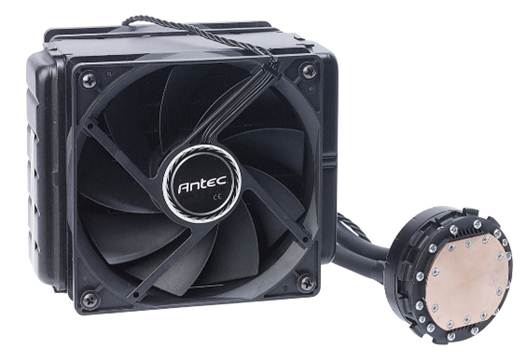Water Coolers
Sealed water coolers are all the rage right
now, and with better temperatures than heat sinks and a smaller footprint it's
easy to see why. One of our favorites is the Asetek-made Antec Kúhler H2O. This
$80.93 device can mount to almost any case with a 120 mm fan mount and provides
great performance. It's fiddly to fit, but provides very good cooling for a
price that's competitive with high end regular heat sinks.

Antec
Kühler H2O
Graphics Card Coolers
If your video card's cooling fan is either
too noisy or not up to the job of keeping a card cool when being overclocked,
you can fit a third-party alternative. Some of best of these products are the
Arctic Cooling Accelero range. These promise temperatures 35° cooler than
reference designs at a much lower noise level. Their three fan design means
that more of the video card is actively cooled as well, allowing you to push
for higher clock speeds if your video card allows for voltage adjustments. At
$80.93 each these coolers are expensive, though. It's probably more cost
effective to buy a model with a similarly souped-up cooler as standard.

Arctic
Cooling Accelero Twin Turbo
Thermal Paste
A quality thermal paste should not be
underestimated in its ability to reduce your temperatures. The ideal paste is
easy to apply, provides great performance and should be non-capacitive or
conductive in nature. Arctic Silver 5 is tough to beat for CPUs with heat
spreaders, as its consistency spreads well under a CPU Cooler and it provides
great temperatures. It costs $14.55 for a 3.5g tube, however, which makes it
expensive. The same price will buy you a 4g tube of Arctic Cooling MX-4. This
provides temperatures competitive with ASS, but as it's not metal based it's
much better for use on video cards and VRM chip where the capacitive nature of
Arctic Silver can be disruptive. MX-4 is also less viscous, making it very easy
to apply and spread in applications where you need to cover a large surface
area with no gaps - for example a bare silicon CPU or GPU. It gets our
recommendation as the best overall paste.

Arctic
Cooling MX-4
Power Supplies
PSUs are one of the most important
components in any PC, yet often overlooked. All too many people stick with the
'500W' piece of junk bundled with an inexpensive case and wonder why their PCs
conk out. It's much better to invest in a quality branded unit with 80 PLUS
certification and enough juice to power your specification. We'd not recommend
any PSU without an 80 PLUS badge, as without one there is no guarantee
whatsoever that the PSU is capable of outputting its claimed wattage. The 80
PLUS program is now divided into different classes - vanilla 80 PLUS, Bronze,
Silver, Gold and Platinum. The higher the rating, the more efficient the PSU.
In reality, however, the power savings from a cost basis are quite modest and
you won't recover the costs of buying a platinum-rated Enermax PSU compared to,
for example, a Corsair Bronze rated model.

BeQuiet
Pure Power 530W
You should invest a good share of your PC
budget on your PSU. Of the lower wattage models on the market today the BeQuiet
Pure Power 530W stands out as an excellently specified and extremely quiet PSU.
It's 80 PLUS certified, has plenty of connectors and is well priced at $79.31.
If you need more juice, the $111.68 Corsair CX750 is a real bargain. New to the
market this month, it delivers 750W of real power with an 80 PLUS Bronze
efficiency. It's the ideal PSU for a high end gaming PC. If you are building an
SLI or CrossFire monster requiring a kilowatt class PSU, the Xigmatek Centauro
is a quality model that stands out as $97.11-$113.3 cheaper than its
competitors. It lacks the ultra-tight voltage regulation of the best on the
market (Seasonic and Enermax) but for the money ($158) you can't go wrong.
Fan Controllers
An easy way to reduce the noise level of
your PC is to add an RPM controller to your case. Then, you only need to turn
up the wick on your fans when you know the PC is going to be working hard. One
of the best priced fan controllers on the market is the Zalman ZM-MFC1, a
five-fan controller with analogue dials. It has a slick anodized aluminium
finish and can control both PWM and three-pin fans at the same time. Our advice
is to avoid flashier products with touch screens and LED read outs - these are
needlessly expensive and rarely allow you the same RPM flexibility as a
traditional rheostat. You can pick up one of these Zalmans for the princely sum
of $39.65 from ShinyHardware.

Zalman
ZM-MFC1